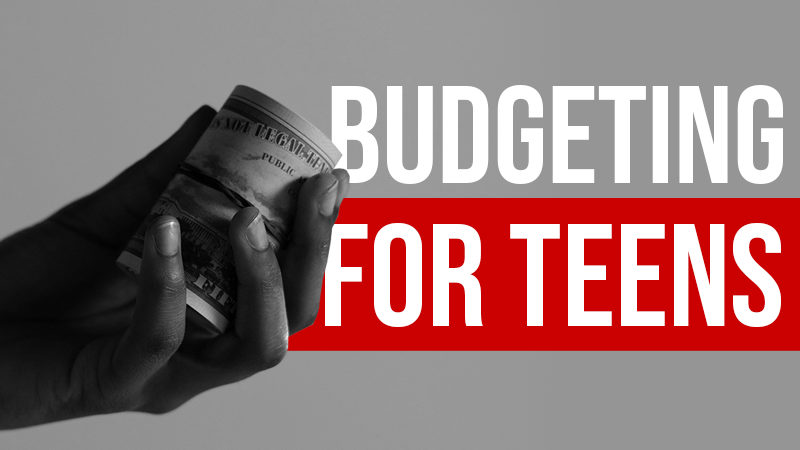Budgeting For Teens: Top 3 Effective Budgeting Tips For Teenagers
Share this content :

At school, we’re taught everything there is to life, or so they say. As kids, we learn all the basic concepts of science, grammar, mathematics, or even physical education. However, one equally important lesson that we were never taught is finance, especially budgeting for teens. In fact, a survey from Fox Business revealed that 87% of teenagers in the US did not know how to manage money. Both working and non-working teenagers did not know how to properly budget their expenses and felt that they needed to learn how to handle finances properly.
Imagine how tough it would be for teens to go out in the world and try to earn money without even knowing how to do budgeting for teens? I remember going through that, and I’m sure many of us wish we could change how we took care of our money before. That’s why in this article, I’d like to share a beginner’s guide on how to do budgeting for teens.
Keep reading to learn more budgeting for teens secrets and to find out a step-by-step breakdown of the basics of finance and how you can protect your wallets.
What Is a Budget?
First, let’s explain what the term “budget” means. A budget is a financial plan of action that considers how much money you have and how much you’ll spend. When we started working, we used to think that our budget was all of our salaries. Or you may have thought that budgeting for teens is all about setting aside your school allowance. It took years for us to learn of other ways that a budget can be divided. Some people may divide it into sections, such as weekly or monthly funds. Others might go further and organize their budget based on their needs, like groceries and tuition fees.
In other words, a budget is an outline of your current funds and the costs you plan to pay. Whenever you’re planning to buy something, checking your budget is a good start to knowing how much you can spend. By examining what is available, budgeting for teens is easy because they can see how much they risk losing. For example, a budget for groceries should be enough to give you food for a week or longer. Sometimes, this means that you won’t have enough money to spare for your favorite treats. By remembering the budget, you can always remember why you had to say no to your favorite junk food.
What Are Expenses?
If the budget is the plan of action, then expenses are the choices or decisions you make. Expenses are the different costs of all that you want or need to buy. These include the price tag for your shoes, the amount of gas for your car, and the number of meals for your day.
Expenses are unavoidable in all financial decisions. When budgeting for teens, some people assume that they’ll be able to get something free. For example, college students might think that even if they run out of food money, their parents could cover it. Even if you’re financially secured by your loved ones, never assume that anything is for free when budgeting for teens. It’s a good practice to ask your parents or guardians how much a certain thing costs. You might be surprised just how much money is being spent to afford your house and electricity bill.
For teenagers who are working part-time or at their first job, journal your favorite habits and hobbies. If you enjoy going to the coffee shop to relax or buying a new pair of shoes, check the price tag of each. Compare those expenses to your current income or allowance. By analyzing the numbers, you’ll discover just how much your current lifestyle costs. Once you understand that, you’ll be able to make a suitable budget for teens. If you don’t, you risk overestimating how much your salary is worth and you might run out of cash before the week is over.

What Are Savings?
When it comes to budgeting for teens, savings are one of the most important aspects. You might think you already understand what savings are. Many people consider them to be backup funds or stored bills in the pantry. You might be right, in that savings are cash stored away from prying eyes. However, that’s not the only definition.
When people think of savings, they’re actually referring to the amount of income that isn't used for their expenses. Basically, it’s leftover money that has no place to go.
The critical mistake that a teenager might make is that they think leftover cash means more money for their fun time. I know that I used to save enough cash just to enjoy playing video games and spend it all on nice snacks. However, I soon learned that I can’t always spend everything. I needed to hold some money back and keep it away because of what I wanted to buy later on. This could be a car, a house, and even a plane ride to study abroad.
The best way to view your savings is to think of them as a future pay-off. Treat this cash as your down payment for something you’ll need later on, like retirement money or mortgage fees. You can also divide your savings to pay off several different things, like having a jar for your dream trip or your wedding. When it’s time to start budgeting for teens, always keep these goals in mind when you have leftover cash. This way, you’ll be able to avoid overspending and you’ll be happier for it.
Budgeting Tips to Consider
You’ve set a budget for yourself for the next year and the year after that. You’ve already calculated your expenses and discovered how much money you will save. This basic plan should help you better manage your finances. However, if you’re looking to expand your savings amount or adjust your budget, here are some tips to help you get started.
Track Your Expenses In Detail
We often like to see our expenses just as a number. Whenever we start our budget, we might think of spending only $80 out of $100 per month. The problem is that numbers can only go far. How you use that cash is just as important. $80 for food and travel is nice, but that doesn’t mean you won’t be spending the extra $20 if you have tuition or loans to cover.
To make it easier, divide your expenses based on your wants and needs. Check the price for each or how much you are willing to spend for them. If you find that your budget isn’t going to cover it, review what expenses you wrote down. Cut out the ones that aren’t urgent in your life right now. For example, if you have to pay for rent, you might need to postpone buying those new Air Jordans you want.
Set Multiple Budget Sections
Budget plans also come in different ways. You can have a budget plan for your daily life, your diet, and your clothing plans. Remember to set aside time to build up a proper budget outline for all the things you need to buy and spend on for the month. For example, you can arrange the budget to cover travel and food. By limiting how much you spend in each area, you’ll get more for your total savings. In addition, you can adjust your budget if you keep overspending on something vital like medicine or insurance.
Consult Your Parents
The survey from Fox Business also revealed four out of five teens saw their parents as good financial role models. If you want to be better prepared when budgeting for teens, always take time to learn from your parents and other adults. They’ve got more experience in saving money and in estimating the cost of their lifestyle. Furthermore, you can always ask the adults about what investments to consider in the future.
For example, many of you may not yet know what Roth IRAs or 401(K) savings are. These are retirement plan options that you can start building and paying for as early as now. The sooner you start, the better prepared you’ll be in building a budget and paying for your future.

The Bottom Line About Budgeting for Teens
With these key financial concepts, you’ll have a better idea about how money works in the world. With enough time and practice, you’ll learn to avoid spending beyond your means. Some of you may make mistakes, such as overestimating your budget or using up your savings too quickly. If that happens, don’t be disheartened. These mistakes are part of life and, as long as you learn how to avoid them, you’ll develop a better plan of action for the future.
After knowing how budgeting for teens work, you can checkout our new video on effective ways to make money online as a teenager.
Share this content :
Copyright © 2023 Munif Ali. All rights reserved.

